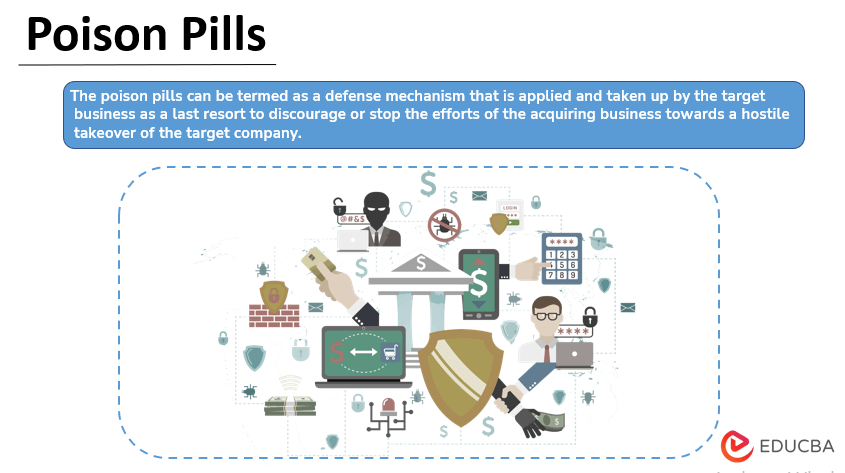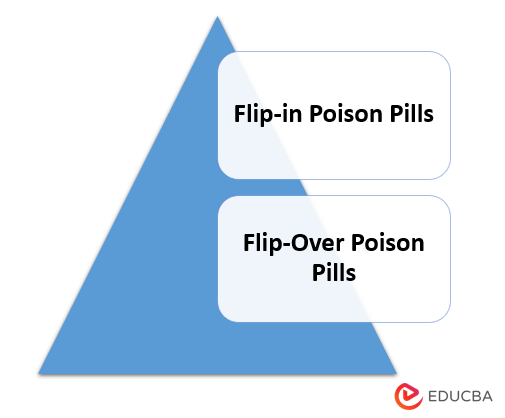Updated July 21, 2023

What is a Poison Pills?
The poison pills can be termed as a defense mechanism that is applied and taken up by the target business as a last resort to discourage or stop the efforts of the acquiring business towards a hostile takeover of the target company.
The target company makes the value of shares reach an unfavorable level so that the acquiring business cannot initiate a hostile takeover.
Explanation of Poison Pills
This is a defense mechanism taken by the business, looming under a potential hostile takeover. This is also termed a shareholder right plan wherein the value of the shares is made to reach an undesirable level, allowing the target company to make itself look unpleasant to the acquiring business. It makes the acquiring firm negotiate terms with the target business rather than initiating a force hostile takeover of the target business.
A hostile takeover can be regarded as the event wherein the target company has rejected the offer of the acquiring business towards a potential takeover by it. Still, the acquiring company continues to attempt to take control of the target business without the consent of the board of directors of the target business.
How do Poison Pills Work?
A poison pill is initiated by allowing the existing stockholders to purchase the shares of the takeover business at discounted or below the fair market value. This event adversely impacts the hostile entity’s interests since the ownership is now diluted.
The poison pills are initiated, keeping in view and safeguarding the rights of the minority shareholders. It is also undertaken to prevent imminent changes in the business’s management structure. At times, the target company initiates the process of a poison pill to negotiate better and more favorable terms for the acquisition.
The poison pills are initiated as per the approvals of the board. The target business adopts strategies that ensure the acquisition cost is appreciated. In such a scenario, existing stockholders are allowed to buy additional shares at a price that is at a discount, thereby resulting in a dilution of ownership for the hostile entity.
Example of Poison Pills
One prime example of poison pills is that of Gain Capital Holdings Inc. In 2013, FXCM Inc attempted to acquire Gain Capital, wherein the target business initiated the poison pill. It executed a shareholder right plan that allowed the existing shareholders to purchase 1/100th stock of the preferred stock series. The target business decided to distribute these rights as dividends to the common shareholders.
Types of Poison Pills
There are two broad types of Poison pills. They can be classified as flip-in poison pills and flip-over poison pills.
1. Flip-in Poison Pills
- The flip-in poison pills enable the existing shareholders, excluding the acquirer, to make purchases of shares at a discounted price. The purchase of discounted shares allows the shareholders to make an instant profit and simultaneously dilutes the holdings of restricted shares that the acquiring company bought.
- Before the takeover is initiated, these rights to buy additional shares are given to the shareholders. Then the acquirer buys above the threshold limit; these rights get activated. The company’s charter and bylaws document such flip-in poison pill plans and could be accessed easily on public domains.
- When a bidder is made aware of such a strategy, he or she may discontinue the plan of taking over the target business.
2. Flip-Over Poison Pills
- The flip-over poison pills strategy enables the existing shareholders of the target company to buy the stocks of the acquiring business at a discounted rate, provided the acquiring firm can make a successful takeover. This makes the acquirer stop the takeover activity as it could cause a potential dilution of holdings post-acquisition event.
- There could be a case wherein stockholders of the target business get exclusive rights to purchase the acquiring company’s shares at the two-for-one rate, resulting in dilution of ownership for the hostile entity.
- There are other variants of poison pills such as golden handcuffs, Voting plans, preferred stock plans, and voting plans. The golden handcuffs are only stock option schemes for employees with specific performance metrics. The stock options are active once there is an attempt of unsolicited takeover. In the voting plan mechanisms, though the acquirer has the most significant number of shares, the holder of preferred stocks is vested with special voting rights making the takeover unattractive.
Reasons for Poison Pills
It is usually performed to increase the cost of hostile acquisitions. There are broad motives to initiate such a corporate action. The first motive is to completely stop or deter the efforts of the acquiring business to press a hostile takeover over the target business. Secondly, it is initiated to safeguard the minority shareholders’ interests. Lastly, the target company is playing the game of “hard to get,” wherein it shows that it does not want to be acquired, but at the same time, it intends to initiate favorable terms towards such acquisitions.
Advantages and Limitations
Here we discuss the advantages and limitations given below:
Advantages
- It helps the existing management and board of directors to retain control over the company’s business operations.
- It discourages the attempts of takeovers that are of monopolistic type.
Limitations
- It can potentially damage the long-term value of the shares issued by the business.
- It dilutes the overall holdings of the stock for existing shareholders as well, and they have to buy additional shares to balance their portfolio value.
- Since takeover attempts are thwarted, the presence of incapable and ineffective managers prevails, and they remain employed, which results in operational inefficiency.
Conclusion
The poison pills, also termed a right shareholder plan, is a defense tactic adopted by the target company to discourage a hostile takeover by the acquiring business. It generally attempts to increase the acquisition cost for the acquiring company by adopting a strategy that makes the value of shares unfavorable for the acquiring firm. Here are two broad categories of poison pills, namely flip-in and flip-over poison pills which result in dilution of ownership for the acquiring company post takeover event.
Recommended Articles
This is a guide to Poison Pills. Here also discuss the introduction and how poison pills work along with examples and types. You may also have a look at the following articles to learn more –


